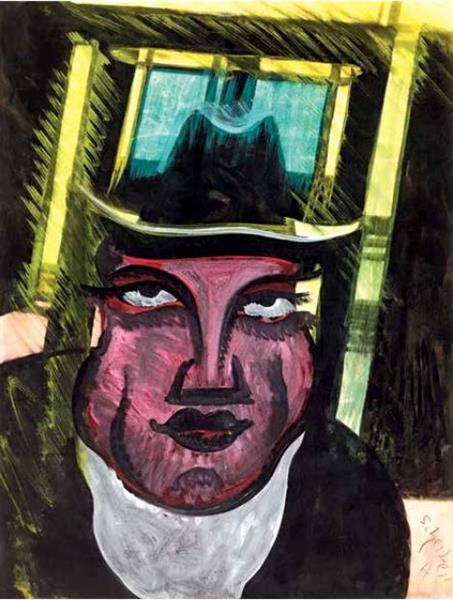Description
The work "Önarkép - 1930" by Hugó Scheiber is a brilliant example of the artist's ability to capture not only the essence of his subjects, but also the spirit of his time. Born in 1886 in Hungary, Scheiber became a key figure within the movement of the new society, a style that sought to break with the academic art traditions and explored new horizons of expression, using forms and vibrant colors that challenged conventions.
In "Önarckép - 1930", the artist presents an self -portrait that transcends mere physical representation. The composition is remarkably introspective; The artist's eyes seem to cross the surface of the canvas, suggesting a deep connection with the viewer. The simplification of facial features and the choice of a background in soft and monochromatic tones allow the emphasis to fall on the expression and nuances of the face, which transmit a series of complex emotions. This is characteristic of Scheiber portraits, where the search for the human soul becomes the main focus.
The use of color in this work is a crucial element that cannot be overlooked. The warm tones predominate, with a palette in which ocher, yellow and subtle touches of red predominate, which provide a sense of warmth and emotional approach. Through the application of loose brushstrokes, Scheiber manages to not only give life to his own portrait, but also to the atmosphere of melancholy and reflection that surrounds him. This color treatment resonates with the influences of fovism, which valued freedom of expression through chromatic saturation.
An intriguing aspect of "Önarckép - 1930" is how Scheiber uses light. The lighting in the work suggests an internal point of view: it seems to emanate from the artist's own being, highlighting the factions of his face and projecting shadows that intensify the three -dimensionality of the portrait. This technique provides depth and a sensation of volume, making the viewer feel immersed in the work.
Although this painting is mainly a self -portrait, it is interesting to note that in Scheiber's pictorial practice there is a constant search for identity and the environment. Often, his works are impregnated with a social and psychological context that invites reflection. His style, which evolves from a more academic approach to greater abstraction and expressionism, reflects the tumult of Europe in the early twentieth century.
The relevance of "Önarckép - 1930" not only lies in its aesthetic quality, but also in its representation of a moment in the history of Hungarian and European art, where cultural identity was in full evolution. Scheiber, like many of his contemporaries, sailed through a changing world and looked for his place inside him through painting. In this work, not only a physical self -portrait is observed, but an exploration of subjectivity and being, issues that still resonate in contemporary art.
Thus, "Önarckép - 1930" is erected as a testimony of the mastery of Hugó Scheiber, a pioneer whose vision continues to enrich the legacy of Hungarian and universal art. This self -portrait encapsulates an emotional and technical complexity that invites the viewer to a contemplative experience, reminding us that art is, in essence, a form of introspection.
KUADROS ©, a famous paint on your wall.
Hand-made oil painting reproductions, with the quality of professional artists and the distinctive seal of KUADROS ©.
Art reproduction service with satisfaction guarantee. If you are not completely satisfied with the replica of your painting, we refund your money 100%.

